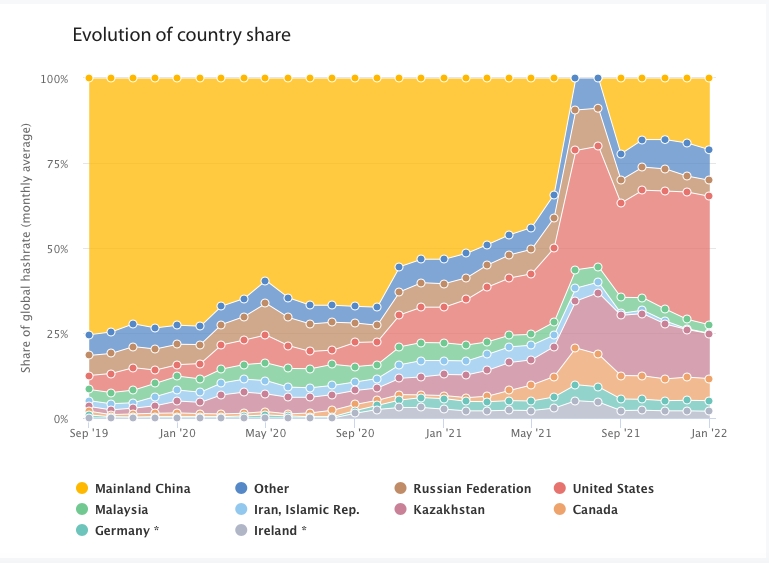The dangers posed by centralization are a recurring topic in the crypto ecosystem. The recent success of Ethereum’s move from a proof-of-work consensus mechanism to proof-of-stake has raised new debates around the risks posed by the centralization ETH placed in staking within pools such as LidoFinance. A similar issue has been raised for Bitcoin and could arise with hashrate concentration in the United States. Could Bitcoin find itself facing the same difficulties encountered in China after the migration of miners to American territory?
A few years ago, China was the world center of mining of Bitcoin with a hashrate approaching 75%. According to the latest data from Cambridge Center for Alternative Finance, the United States currently accounts for almost 38% of the global Bitcoin hash rate and, surprisingly, China is in second place, with 21.11% of the hash rate. American Bitcoiners continue to promote and try to attract mining companies to North America, including lobbying regulators to create a favorable legal environment for them to operate.

It should also be noted that the distribution of the hashrate on the American territory also shows a strong tendency towards centralization: indeed, Georgia, Texas and Kentucky contribute to almost half of the hashrate of the country, even if an activity significant can also be observed in the states of New York, California, North Carolina and Washington.
However, educator and podcast co-host Block DigestShinobi, note that this calculation could weaken the Bitcoin network in the long term. Indeed, the theoretical principles around Bitcoin mining security are based on decentralization. Control of a majority of the hash rate by a single entity can lead to a security breach across the entire blockchain architecture, via a 51% attack. Another risk is at the level of regulation and jurisdiction: indeed, to operate legally, minors must submit to the laws and jurisdiction in which they settle, with the consequences that this implies. For a power company, it is relatively easy to identify public companies, mining facilities or local businesses with a high enough hash rate by their power signature. All of this hash rate is subject to enforcement action by the US government, with varying degrees of difficulty.
Furthermore, it is important to note that the position of the US government and regulators is far from favorable to Bitcoin and the crypto sector as a whole. Bitcoin’s positioning as a possible alternative to the US dollar as a reserve currency has certainly not escaped analysts. Indeed, the economic power of the American government is linked to this privileged position of the dollar in the global financial system, which makes it possible to guarantee the effectiveness of the sanctions applied to the so-called “rogue” States. Although Bitcoin is still far from dethroning the dollar, the opportunity for US regulators to control 38% of the hash rate if necessary is very real.
This idea might seem absurd at first glance until one of the contributors to BitcoinCore, Peter Toddbrought to the attention of the community the existence of a project called chain anchor designed by the Massachusetts Institute of Technology. The project aims to neutralize Bitcoin’s censorship resistance. Although project officials have repeatedly denied that the project was intended to apply to Bitcoin, Todd says multiple sources have confirmed that the goal is to make the Bitcoin blockchain an authorized payment platform by bribing miners .
The events that unfolded in China, however, can give hope to the crypto industry. Indeed, most observers agree that the bans imposed by China and the subsequent exodus of miners have proven the resilience of the Bitcoin network. However, it remains undeniable that the concentration of the hash rate in a single jurisdiction is less than ideal for the future of Bitcoin.
Follow our affiliate links:
- To buy cryptocurrencies in the SEPA Zone, Europe and French citizensvisit Coinhouse
- To buy cryptocurrency in Canadavisit Bitbuy
- To generate interest with your bitcoinsgo to the BlockFi website
- To secure or store your cryptocurrenciesget Ledger or Trezor wallets
- To trade your cryptos anonymouslyinstall the NordVPN app
To accumulate coins while playing:
- In poker on the CoinPoker gaming platform
- To a global fantasy football on the Sorare platform
Stay informed with our free weekly newsletter and to our social networks:
